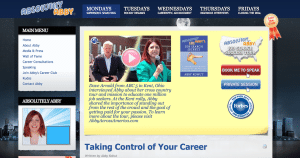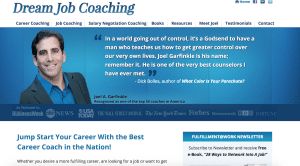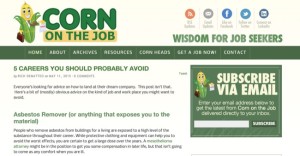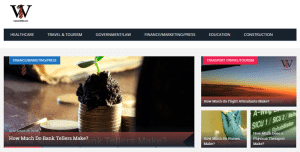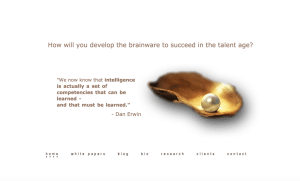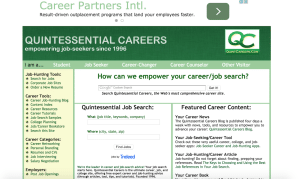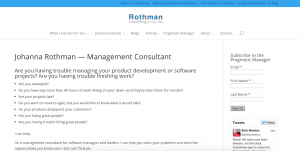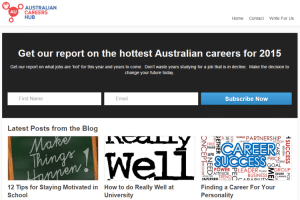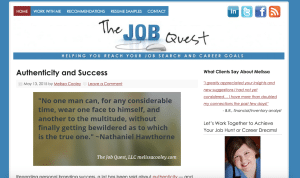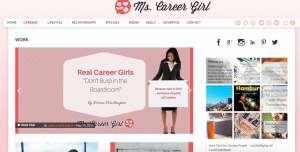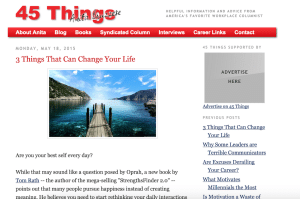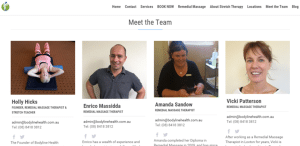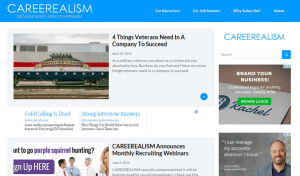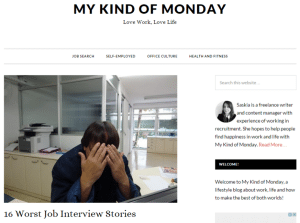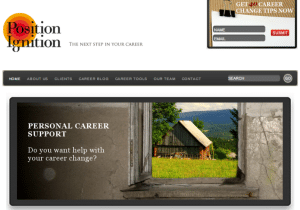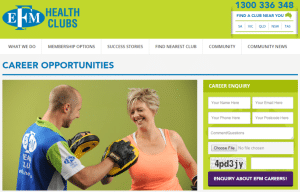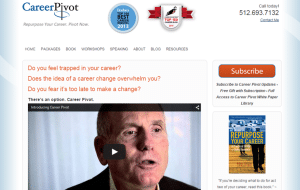Job interviews can be a bit stressful, particularly if you are going after a job that you REALLY want.
To help you to perform at your peak and ace your next job interview, we asked some of the world’s leading career and employment experts for their insider tips on how to succeed in a job interview.
The question we put to our experts was:
“What are your top 3 tips for acing a job interview?”
What we ended up with is potentially the most comprehensive list of job interview tips ever compiled.
Here’s to your success and we hope the tips below help you to land your dream job!
Abby Kohut, AbsolutelyAbby.com
- Be passionate – Explain not only why you are passionate for helping patients, but also explain why you want to work for my particular hospital/organization. My goal is to hire people that will stay at my hospital/organiztion for a long time and you have to prove to me that you are one of them.
- Listen to the questions and answer only them – The one question I always asked at the beginning of an interview was “What kinds of positions are you interested in? Typically, the candidate would start to explain their entire work history and ramble for the next 15 minutes. It was a simple question and it required a one to two sentence answer such as, “I’m interested in a CNA position where I can work with x kinds of patients. I love these kinds of patients because…”
- Wear the right interview clothes – Even if your nursing job requires you to wear hospital attire, you should still wear appropriate interview attire for your interview. When in doubt, ask the recruiter what appropriate interview attire is or just wear a suit. Also, if you wear the colors of the hospital’s logo, you are subconsciously telling the recruiter that you belong there.
Joel, DreamJobCoaching.com
Do Your Research – Do your research, before the interview. You’ll want to learn as much about the company as you can, including what their current successes have been, as well as any announced future plans. This gives you fodder for talking about how your skills and experience are the perfect fit for their company specifically. If you’re coming from a different industry, do your research on the industry in general. Also learn as much about the interviewer as possible. You never know when a random piece of information about the interviewer you’ve discovered will help you build rapport.
- Be Positive – No one enjoys working with someone who’s negative. Even when asked a negative question, such as, “What did you dislike about your last position?” find a way to positively spin your answer. Every position has challenges, but instead of focusing on those negatives, talk about how you gained experience or grew from that challenge.
- Express Your Interest – One of the biggest mistakes a candidate can make is to not let the interviewer know they’re really interested in the job, at the end of the interview. Most interviews end with the interviewer asking if the interviewee has any other questions. This is the perfect time to say, “I’m really interested in joining your team and know I’d be a great fit. What’s the next step?” If there are two candidates with relatively equal skills and experience, and one has expressed their interest in moving forward and the other hasn’t, guess who’s going to be the preferred candidate? The enthusiastic candidate!
Rich DeMatteo, CornOnTheJob.com
- Arrive 30 minutes early – but walk in 10 minutes early. Use the 20
minutes before to clear your head, think positive, and review what you want
to say and accomplish. Coming even just 5 minutes early doesn’t give you
enough time to settle and prepare. - Truly know your background and skill set – Be able to clearly talk about
your accomplishments and know your resume like the back of your hand. You
don’t want to look down when asked a question about your work history. - Ask 5-7 great questions when the interview is over – A few of them are
“How can I ensure that I’m successful in this role in the first 60 to 90
days”. “How can I help others around me be successful in this position?”
“Why is this position open? Where did the previous person holding this job
go? Is this a new role”
Joey Trebif, CareerAlley.com
Your Appearance – It doesn’t really matter what you think about how you look or dress for an interview. It only matters what the interviewer thinks. Skipping the obvious basics like make sure your hair is combed and that you are not wearing jeans and sneakers:
– Don’t wear pants or shirts that are too tight
– Don’t show cleavage (or your midriff)
– Get a second opinion. Ask your friends, relatives and significant other how you look. – How they perceive you is more important than what the mirror is telling you- Your Story – I’m sure you’ve heard of the “30 Second Elevator Speech”. If you don’t already have this practiced and memorized, now is the time to do it. At some point in the interview, you will be asked to give a brief overview of your experience. This is the time to use your elevator speech and to work in the bit about why you are the best person for the job (see #6 below). This is a critical part of the interview and will likely determine how the rest of the interview (and your chances of making the short list) goes.
- Know Why You are the Best Choice for the Position – Leverage everything you’ve learned about the company, the job and the interviewer so that you are convinced that you are the best choice for the position. The delicate balance is between letting your interviewer know you are the best choice without sounding conceited. There is really only one thing the interviewer wants to know – that you are the right person for the role. This is not just limited to your job knowledge and experience, but also your interpersonal skills and how you would “fit” in the overall team.
Noel Griffith, CareersWiki.com
- Ask questions – Don’t ask general questions about the job like how much are you gonna get paid or how many days of vacation you will get. Instead ask questions that will let you start a more in depth conversation like “how can i innovate through this company?”, “what challenges you faced at your last product launch?”
- Do your research – When you go to an interview you should know everything not only about the position you will be getting but about the whole company. Search their website their social profiles and learn everything from the company’s history to your potential colleagues background.
- Understand their problem – Understand why they want to fill that position. They want to increase sales? They want to innovate? Find the answer to that question and show them why you are the best solution for solving this problem
Dan Erwin, DanErwin.com
Be prepared for an interview by taking along a number of stories (each about 4 -6 sentences) from your own experiences that can be adapted to answer questions from an interviewer. Stories are always the most potent response to questions. Stories should aways include context, action and results. Don’t be afraid of telling a story about a failure–as long as you can explain what you learned from the failure.
- By anticipating questions you can prepare a number of below the surface questions that demonstrate your abilities. For example, “I appreciate your question about my educational experience, however, it strikes me that the question behind your question is. . . . Am I right?” Then answer your own question. I recognize that that this is a fairly aggressive approach, but done well, it can demonstrate your knowledge, as well as your awareness and insight. The recruiter then goes away with, “this woman really knows how to ask questions. We can use someone like her. (I consistently built my 30 year old consulting business on the quality of questions I asked–often in response to the client’s question. It also gives you some control of the interview.)
- Sometimes a stroking, vulnerable response to the recruiter’s question (no more than once in an interview) can give you a leg up. “That’s an interesting question that I’ve actually never thought about. Let me get this straight: What you’re asking is. . . . Right? Without any previous preparation or forethought, here’s how I’d answer your question. Then. . . .
Dr. Randall S. Hansen, QuintCareers.com
- Prepare and rehearse – Focus on developing accomplishment stories that highlight the key skills and achievements you have had in your career – relevant to the job you are seeking. Do not memorize, but practice them enough so that you have about 5 stories in your head. Review typical job interview questions and outline solid answers. If you have not been on an interview in a while, consider doing a mock interview with a career professional or friend.
- Research employer/interviewer – Know your employer in-depth, and if possible, learn about your interviewer(s) – from you network or through social media. Develop a few key questions to ask in the interview; asking questions is essential as many hiring managers take it as a sign of interest.
- Develop a 24-hour countdown checklist – Include what you will wear, timetable, leaving plenty of time to get to the interview location about 10-15 minutes early, and any other grooming and other prep that must be accomplished before the interview.
Johanna Rothman, JRothman.com
- Develop questions you will ask a potential employer. Every employer has its own culture and you need to know if you fit. You can do this by asking questions. Your questions will depend on what’s important to you. Whether it’s learning, patient care, or how teams of people work together (or don’t!), your questions will help you learn about what you need to know about a job.
- Make sure you bring a copy of your resume with you. Yes, I am sure you applied online and submitted an online resume. And, I am equally sure that not everyone who is interviewing you has read your resume, or has a copy of it. If you bring one, your interviewers see you as someone who can problem-solve in advance.
- Research the organization before you go to the interview. Look for examples of their current nurse to patient ratios, if they have gotten any press (good or bad), and other things depending on the position. For example, if you are an oncology nurse, are they doing clinical trials for any kinds of cancer? Would that make a difference to your job? The more research you do, the more ready you are for their questions and to prepare your questions.
Jake, AustralianCareersHub.com
Do you research on the company you are interviewing with. Try to get a grasp on what their main business is (manufacturing – what products, service – what services, consumables – what are their key product lines). Knowing this will help you better understand how you and your specific set of skills will bring value to the company.
- Practice the interview before the interview. Have someone conduct practice interview sessions with you before the big day. Have them run through the entire gamut of questions (you can find tons of example interview questions online) so nothing catches you without a prompt and educated response. If you have the resources consider video taping your practice interview. You make think you’re coming across calm and assertive when in reality your leg is shaking and your eye won’t stop twitching. Practice makes perfect.
- Remember you are interviewing them as much as they are interviewing you. Utilize the research you conducted and ask probing questions about the position you are interviewing for. Ask if you will be involved in project X that has yet to be officially announced or supporting project y. Not only with this show you’ve done your homework, it will show you are actually interested in the position and not just the attached paycheck.
Melissa Cooley, MelissaCooley.com
- Know your career story – Interviews are increasingly using behavior-based questions. It’s not “What are you like in stressful situations?” It’s “Tell me about a time that you had a stressful situation at work. What happened, and how did you handle it? What was the result of your actions?” Talking about how you would do something in theory is meaningless. Interviewers want to understand how you were really able to apply the skills and knowledge you have to real-world circumstances. They want to “see” you doing the work and figure out how it applies to their company. Being able to tell the stories of your career will provide the context that interviewers want.
- Articulate your accomplishments – Some job seekers have a hard time taking ownership of the good they have done on the job because they deflect attention away from themselves, instead putting it on the group. While teamwork is a good thing, as is not overstating the influence you had regarding the direction and outcome of a project, not embracing the role you played diminishes their understanding of your value. You don’t need to be a braggart about it; just factually tell them what happened and the results. If you don’t, interviewers won’t know about what you have to offer because you haven’t told them.
- Eliminate unnecessary stress – Interviews carry a certain degree of stress, even when a candidate has prepared well. However, there are some candidates who add stress to themselves, and that doesn’t need to be the case. Finding out the night before a big interview that the outfit you were going to wear has a stain on it, deciding the morning of that you really need a haircut, or discovering on the drive to the interview that your cell phone has died (and you forgot your charging cord) creates a lot of stress that distracts job seekers and makes it much more difficult to apply their energies toward tasks that will help them nail the interview.
Andrea Hupp, VeterinaryTechnicianGuide.com
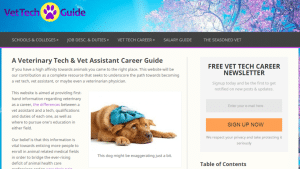
- Study the clinic well – Almost every pet clinic has a website now (at least the reputable ones). Find out everything you can about the veterinarians working there and the clinic’s history. You can learn a lot about its culture just from reading the about page and what each staff member wrote on it.
- Don’t be rude to general staff members – Just because you have a college degree or a veterinary technician degree does not mean you get to be rude to the receptionist. Most animal care clinics are run as a family and the staff closely care and respects each other. Heck, the receptionist might actually sit in the interview panel, so make sure you pass the friendly test before your name is even called on.
- Be ready to share your weaknesses as well as strengths – When asked “What is one thing about yourself you would like to improve?” Don’t answer “I work too hard”. That might impress your date but not us. Here you have the opportunity to not only show us you are able to self-criticize, but also how candid you are with yourself and us.
Abbi Gabasa, MsCareerGirl.com
Introduce yourself first – Take control of your fear and get ahead with
a small display of confidence. Upon coming into the room, flash a smile to
your interviewer, say good morning/ good afternoon, introduce yourself, and
thank him/her for her time. This shows an eagerness and confidence that can
reflect well on your application. Just be sure to be confident and not
smug. Keep it short and sincere.- Be Direct to the Point – Do not beat around the bush. Your interviewer
does not have a lot of time to hear out elaborate stories. Cut to the chase
and make sure you are giving an answer that does two things – directly
addresses the question, and is substantiated in a few sentences by
explanation and/or examples. - Ask a Question – Asking a question shows your interest in the company
and in the position you are applying for. Make sure that you think of
several possible questions to ask the interviewer even before you come in
for the interview. This prevents you from asking a question that has
already been addressed in the discussion. You do not want to appear like
you are not paying attention or that you are redundant.
Anita Bruzzese, onthejob.45things.com
Do your homework on the company, the job and the industry – so you can show your knowledge to the interviewer.
- Practice – Ask a friend or family member to practice interviewing you with common interview questions (what are your greatest, strengths, weaknesses, etc.) and video record your “interview.” Then look for ways to improve.
- Look your best – You make an impression on an interviewer within seconds of meeting him or her. Make sure you’re neatly groomed, dressed appropriately – and leave your phone off and in your pocket!!
Holly Hicks, BodylineHealth
- Be Yourself – We’re a people’s business and what we really look for, and presumably many other employers are looking for, is to try to get a feel for who you are. Your resume gets you the interview but your interview performance gets you the job. So be yourself and reveal yourself throughout the interview.
- Research! – Understand about the company or business you are being interviewed for. Take a detailed look through their company website, drop into one of their stores or outlets and see if you can speak with other staff members to get a feel for what the organisation is all about
- Establish Common Ground – You’re selling yourself in a job interview and there’s an old saying in sales that goes “people do business with people that are like themselves”. This is where your research comes into play! See if you can identify some common ground prior to the interview with the interviewer or panel of interviewers and then you can strategically weave that common ground into the interview conversation. It creates instant rapport!
Scott Richards, CareerWaymark.com
- Research – Research your employer and the job opportunity using the company website, published materials and your network.
- Get Prepared – Prepare answers for the most common interview questions. Make a list of the most common interview questions and practice answering them, being sure to provide previous examples wherever possible.
- Be Punctual – Arrive on time for the interview. Aim to arrive at the interview venue 10-15 minutes before the start of the interview. This will ensure you have enough time, in case the venue is difficult to find.
Karl Staib, WorkHappyNow.com
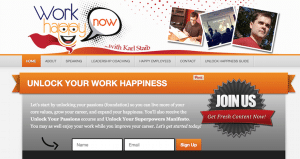
it’s not about you. It’s really about them.
- Enjoy your interview – If you go in with the mindset of enjoying the experience and being in the moment it won’t feel as much pressure to perform.
- Stay true to your core values by being yourself (confidently) – The second part is being yourself and staying true to your values. It’s important that you do this with confidence. Hopefully they aren’t looking for a “yes” person. They should want someone that also has ideas and wants to follow through on them.
- Find connections – The 3rd is finding connection points with people you are interviewing them. Don’t wait to ask questions until the end. Ask questions the whole way through the interview so you can build rapport and find ways to connect with people who are interviewing you.
Ariella Coombs, CAREEREALISM.com & CareerHMO.com
Prepare – Make sure you have a good understanding of the company before
you go into the interview. You can research them on their website, LinkedIn
company page, Glassdoor.com, as well as check out any recent articles/press
releases that have been written about them. Also, if you really want a
better understanding of the culture, set up an informational interview with
someone in the company! Your goal is to understand who they are as a
company, what they want to achieve, and figure out what ways your unique
strengths can make an impact.- Be enthusiastic! – Believe it or not, enthusiasm makes you stand out as a
candidate. If you genuinely seem interested in the company, role, and the
culture, they’re going to like that. So, smile, ask questions, and talk to
people.meet - Send a thank you note – This is a big one. Within 24 hours of your
interview, you MUST send a thank you note to your interviewer(s). Thank
them for taking the time to meet with you, answer your questions, and show
you around. Not only will they appreciate the gesture, but they will likely
take it into consideration when it comes down to you and another candidate
who failed to send a thank you note.
Saskia, MyKindOfMonday.com
- Preparation is key. Do your research on the company and the job and prepare some questions to ask the interviewer. Also, prepare some answers to common interview questions following the STAR technique (situation, task, action result). Having these prepared will not only help you answer questions on the day, but it will also give you more confidence going in.
- Make a good first impression. You only get one shot to make a first impression, so make it count. Be there on time, dress appropriately and think about your body language. Even if you’re feeling nervous, try to smile, keep an open posture and stop fidgeting.
- Don’t panic if you give a bad answer. No matter how prepared you are, chances are you’ll bumble at least one question. Don’t worry, try to relax, take a deep breath and rephrase your answer. Turn this awkward moment into an opportunity to show them how well you can handle a difficult situation.
Nisa Chitakasem, PositionIgnition.com
- Do your research – The more you know, the more prepared you will be for the interview. This means understanding as much as you can about the company, the role, who you¹re going to be talking to, who you might be working with, where the company is going and why they are hiring. Read about the company in the press, visit their website and social media profiles and also see if you can speak to people already working at the company or who may have previously worked there. Give yourself as much insight as you can to build up your confidence and give you that extra edge in your interview.
- Ask questions & be active – Show that you are genuinely interested in the role and remember that a good interview should be a two-way process just like any other conversation. Be both engaged and engaging. Show that you want to know more, that you¹ve done all the research that you can and that you are thinking seriously about the role. Ask questions that dig deeper into the world of the organisation and your role there. Help them to understand that you are keen to bring real value to the company and to make an impact within the organisation. Also remember that you have to decide for yourself whether or not you want to work for this company or not. Take this opportunity to ask as many questions as you need, to help you with this decision.
- Listen hard – Don’t talk at the interviewer or over the interviewer. Give them space to talk as well and listen really carefully to what they have to say. Ask them to clarify what they mean if you aren¹t clear on anything and don¹t be afraid to take some time to think before you respond. Check out the PositionIgnition.com eBook called How to Ace the Interview!
EFM Health Clubs, efm.net.au
- Be You – Our service to our members is highly personalised and our goal is to blow our members away with how friendly and personalized their work out is each and every time they come in for a fitness session. So when our Franchisees are interviewing potential employees, they want to be able to get a feel for your personality. It’s important to note that we don’t have a set personality profile for our staff members. We have very successful staff members that are outgoing and very extroverted and staff members having the same success that are introverted and more quietly-spoken. Just go into the interview and be you and let your personality shine!
- Be Prompt – Many of our members attend early morning sessions prior to preparing for their workday. They cannot be waiting for the studio doors to open at 5 minutes past opening time. Being late to a job interview is pretty much an automatic out because we’re all about WOW-ing our members and can’t afford for staff to let our members down. Plan to arrive 20-30 minutes early so that you leave yourself plenty of time for any traffic issues that could make you late and miss your opportunity.
- Understand Us – It’s surprising how many people come to job interviews and don’t fully understand the history and background of our business. Take some time prior to your interview to research the company you are being interviewed for so that you can confidently answer company-specific questions.
Emily Bennington, EmilyBennington.com
- Look the Part – This does not mean you have to be the most attractive person in your office. It simply means that you must look like a potential leader. It means crisp clothes, conservative accessories, and an aura of confidence that comes from knowing you are a professional to watch.
- Communicate with Authority – So what if you don’t actually have any right now. You can still present your ideas articulately and with command. A note on technique though: Passion is good. Raw passion, however, is a disadvantage. This isn’t the time to steamroll others into your point of view. This is the time to know when to speak with assurance…and when to listen with diplomacy.
- Control Your Message – All of your nonverbals – e.g. how you dress, sit, walk, shake hands, pay attention, etc. – add up to affect the image you create in the mind of others. The good news is that these are all things inside your control. Take your work space for example. Even if you are caught up and 100% on top of your game, if you are surrounded by scattered papers, random post-its, and old coffee cups, chances are your colleagues are going to view you as overwhelmed and not ready for more challenging assignments.
Marc Miller, CareerPivot.com
- Walk into the interview with confidence – Follow these three easy steps spelled out in this blog post –> http://careerpivot.com/2014/3-steps-walking-interview-confidence/
- Answer every question with a story – Let me tell you about the time when ….. Develop a story for every requirement in the job description. You can read more here –> http://careerpivot.com/2014/adding-storytelling-interview-process/
- Be prepared to probe for pain points in the interview – What problems is the hiring manager trying to solve with this hire? After you understand the problems you can demonstrate how you can solve those problems. You can read more here –> http://careerpivot.com/2014/probing-for-pain-points-in-an-interview/
Wrapping Up:
There you have it, over 60 tips from some of the world’s leading experts on careers, employment and job interviewing!
If we were to pull out four key messages that tended to show up in most responses, it would be that you must focus on being prepared, punctual, relaxed and above all, just be yourself!
Here’s to your success and please take a moment to share with others that can benefit from our expert advice!


